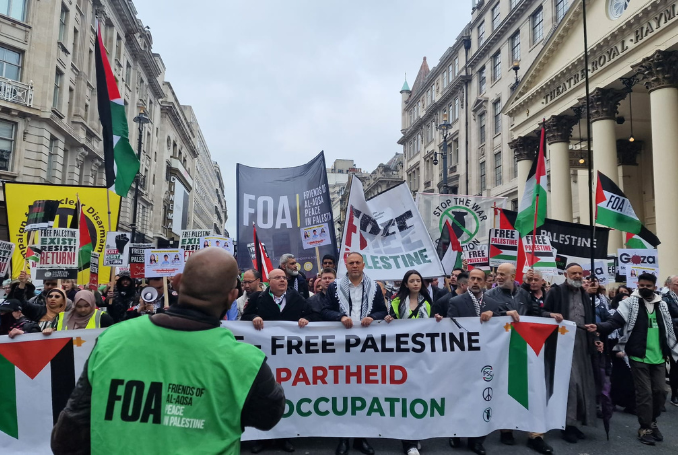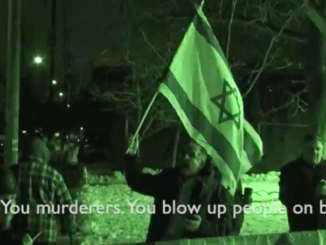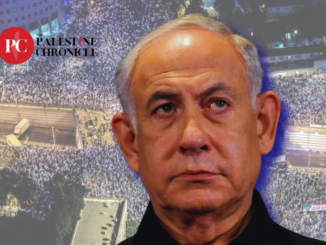
By Asim Qureshi
At the heart of this crisis is a fundamental misunderstanding — or deliberate misrepresentation — of what it means to express solidarity.
In the United Kingdom today, the line between political expression and criminal offence has never been more perilously thin – as witnessed through the lens of Palestine solidarity – the extent of Britain’s encroachment upon basic freedoms becomes painfully clear.
The ongoing proscription of Hamas is being used as a blunt instrument to suppress, not acts of terrorism, but the articulation of political belief, emotional solidarity and moral outrage. In doing so, the British state has entrenched a system that penalises thought, stigmatizes empathy and punishes dissent.
CAGE International has submitted an application to the UK Secretary of State for the Home Department calling for the deproscription of Harakat al-Muqawwamah al-Islamiyyah (Hamas). The submission documents a disturbing pattern: across universities, hospitals, workplaces, and even primary schools, people are being harassed, suspended, or deported for speech or actions that have been interpreted as expressions of support for a proscribed group.
The breadth of the legislation means that there can be no commonsense approach to legitimate debate and discussion – as the legislation creates an environment of hyper-criminalisation.
Let us be clear: the individuals profiled in these cases were not caught plotting violence, nor were they accused of material support for any armed organization. Their crime, if one can call it that, was voicing grief, solidarity, or political critique. A student speaks emotionally about the war in Gaza — her visa is revoked. A child wears a Palestinian flag — he is interrogated. A doctor tweets in support of Palestinian resistance — she is suspended. The pattern is unmistakable.
Under Section 12 of the Terrorism Act 2000, it is an offence to express support for a proscribed organization. The statute’s vagueness is not a bug but a feature; it is precisely this ambiguity that has allowed for the criminalisation of conscience. What counts as “support” is often inferred through the most tendentious of readings. A reposted article. A throwaway comment. A badge on a jacket. Each is reimagined through a securitised lens as a potential act of extremism.
Yet, as CAGE International’s application shows, it is not only the accused who suffer. What emerges is a society that has turned suspicion into orthodoxy. In schools, children are pulled aside for uttering “Free Palestine”. In universities, academics face disciplinary action for exploring resistance literature.
In the workplace, Muslim professionals are doxed, suspended, and interrogated. The state has effectively deputised educators, HR managers, and immigration officers to act as arbiters of political acceptability.
This moral panic did not emerge in a vacuum. It is the direct consequence of the UK’s post-9/11 counterterrorism regime — a system built not to secure safety, but to discipline dissent. As Dr Sophie Haspeslagh notes in Proscribing Peace, the labeling of political groups as “terrorist” serves a political, not legal, function.
It allows states to silence opposition, foreclose negotiation, and construct an artificial moral binary between legitimate and illegitimate actors. In this schema, Hamas is a terrorist group, while armed Ukrainian militias are celebrated as freedom fighters. The inconsistency is not just a double standard — it is the very architecture of state power.
What makes this repression particularly insidious is its reach. The cases collected by CAGE include international students, NHS doctors, primary school children, and teachers. In each instance, the response from institutions — whether schools, hospitals, or universities — has been one of overcompliance. There is no room for nuance, no space for context. Employers and administrators, desperate to avoid controversy, act pre-emptively, often without evidence or procedural fairness. The result is a chilling effect that ripples far beyond the initial target. Solidarity becomes dangerous while grief becomes seditious.
To speak of Hamas in anything but condemnation is, under the current legal framework, an invitation to investigation. Yet as history teaches us, today’s “terrorists” are often tomorrow’s statesmen. Nelson Mandela and the African National Congress were once proscribed. Sinn Féin’s inclusion in peace negotiations required dropping the “terrorist” label. As Haspeslagh argues, a linguistic ceasefire — recognizing the conflict, removing the terrorist frame, and distinguishing between acts and actors — is essential to any path forward.
Instead, Britain’s proscription regime has entrenched a cultural McCarthyism, where political speech on Palestine is policed not just by the state but by the institutions that claim to protect democratic discourse. Consider the case of “M”, a Palestinian student whose offhand comment to a journalist about 7 October was seized upon by politicians and media outlets.
Her student visa was revoked, only for a judge to later declare that the Home Office’s actions violated her rights to free speech and due process. The reversal is welcome, but the damage was done. For months, she lived in fear, hounded by media, demonised by politicians, and stripped of the ability to complete her education.
Or consider the children: a nine-year-old boy weeping after being interrogated for a sticker. A student isolated for wearing the colours of a flag. A teenager compared to Shamima Begum for questioning state violence. These are not isolated incidents. They are symptoms of a society that has allowed its security apparatus to criminalise compassion and curiosity.
At the heart of this crisis is a fundamental misunderstanding — or deliberate misrepresentation — of what it means to express solidarity. To call for the deproscription of Hamas is not to endorse violence. It is to demand space for political discussion. It is to insist that peace cannot emerge from silence, that justice cannot be achieved through censorship. As CAGE International rightly points out, international law provides mechanisms for prosecuting war crimes. We do not need blunt instruments that collapse politics into criminality.
The United Kingdom government now finds itself in breach of its own commitments under the Human Rights Act 1998 through the repression of freedom of speech and expression. The Prevent strategy, far from achieving its stated objective of safeguarding national security, has always been a tool for racialised surveillance and ideological conformity. The right to dissent, especially on matters of foreign policy, has been eroded under the guise of counterterrorism.
Britain must reckon with this reality. It must acknowledge that its proscription regime, and the counterterrorism laws that underpin it, are no longer fit for purpose. In doing so, it must recognize the cost — not just to the individuals whose lives it has upended – but to the very claims of what it portends to be in a liberal rights-based order.
To speak for Palestine should not be an act of courage. It should be an act of conscience. It is time for Britain to listen — not with suspicion, but with humility.

– Dr. Asim Qureshi is the research director at CAGE, a UK-based advocacy organisation working to empower communities impacted by the War on Terror. He has a background in International Law and is the author of the books “Rules of the Game” and “A Virtue of Disobedience”. He contributed this article to the Palestine Chronicle.








Hamas are freedom fighters. And the British government are War Criminals and Traitors, having sold out this country to ethnic supremacists waging a genocide on behalf of an Apartheid entity.
Hear! Hear!
It’s a crime to NOT speak up about what
” Israel ” has done. Hamas has tried for peace time and time again, only to be rejected and vetoed by the real terrorists in Israelica. My US government is corrupt, and they’ve been paid to side with the Nazis in Wasrael. I object! and i will always speak out against what they’ve done. And, it’s public info that Hamas was paid via the USAID program. The UK is complicit in all that has happened, that’s why they’re clamping down on free speech. It’s easier to silence people than admit complicity.